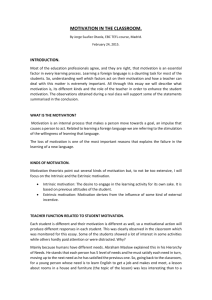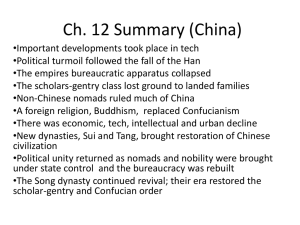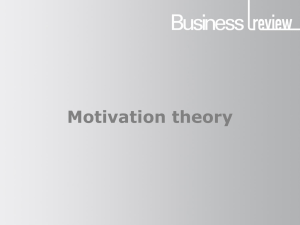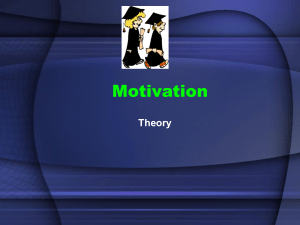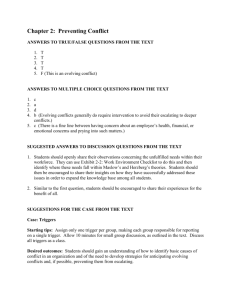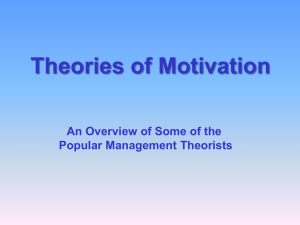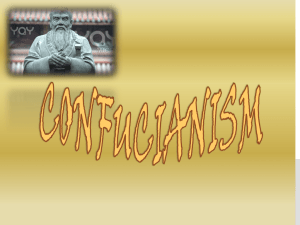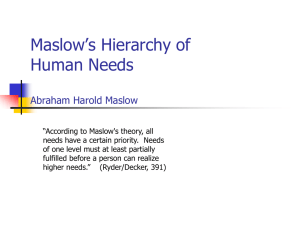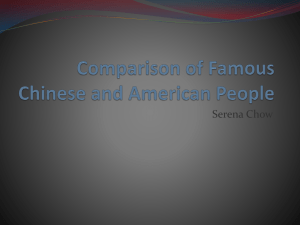Motivation and Leadership from Chinese Philosophy Perspective
advertisement
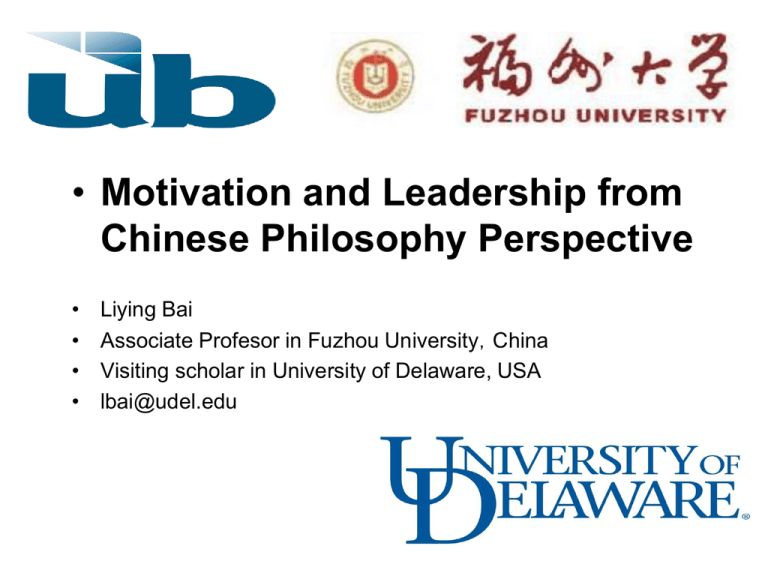
. • Motivation and Leadership from Chinese Philosophy Perspective • • • • Liying Bai Associate Profesor in Fuzhou University,China Visiting scholar in University of Delaware, USA lbai@udel.edu Cultural differences • Huge system, share a few points here… • • • • She, He Hu, Who Creative, Conformism Made or created? • Individual characters are influenced by group and national characters,the deepest part is …… Iceberg Model of McClelland • • • • • • • • • • • • • • • Work Values Auction: 1, Do something for the public welfare 2, Pursuit beauty and an artistic atmosphere 3, Seek creative development of new things 4, Apply independent thinking and analysis 5, Sense of achievement 6, Independence, acting according to their own pleasure 7, Admired and respected by others 8, Supervisory or management others 9, A lot of money 10, Stable and secure life 11, Good and comfortable working environment 12, The relationship with your director is equal and harmony 13, Work together with like-minded partners 14, Be able to choose their favorite way of life 15, No boring work with full of change Maslow’s Need Hierarchy Theory (I) Creative & challenging work Self actualization Praise & recognition Esteem Friendly coworkers Social Safety Physiological Safe working conditions Rest & breaks Ausubel’s Motivation Theory • cognitive drive achievement motivation • self improving internal driving force • subsidiary internal driving composition Herzberg’s Two-Factor Theory Traditional View Dissatisfaction Satisfaction Herzberg’s View Hygiene factors Dissatisfaction No Dissatisfaction - Quality of Supervision - Pay - Company policies - Physical working conditions Motivators No satisfaction - Personal growth - Responsibility - Achievement Satisfaction source: Herzberg, Frederick. One More Time: How Do You Motivate Employees? Harvard Business Review, Jan2003, Vol. 81 Issue 1, p87-96 Comparison of the Three Theories of Needs Alderfer Maslow Herzberg Self-actualization Growth Esteem Relatedness Social (Belonging) Safety Existence Motivator Hygiene factors Physiological Douglas McGregor • “Behind every managerial decision or action are assumptions about human nature and human behavior.” Chinese traditional assumption of human nature debate: people are born good or evil? Theo 1、性恶论 2、性善论 3、尽性主义 4、流水人性 ries 人之初, 人之初, 善恶不是天 个性中心论 性本恶 性本善 生,是后天 (法家) (儒家) 教育的结果 Cont ents 目好色, 耳好声, 口好味, 心好利, 骨体肤里 好愉逸。 (荀子) 恻隐之心 羞恶之心 辞让之心 是非之心 (孟子) 把个人的天赋 良能发挥到十 分圆满,人人 可以自立。 (梁启超) 人性无善与不 善,犹水无分 东西,决诸东 方则东流,决 诸西方则西流。 (告子) 1、People are born evil Xunzi Legalism • Xunzi (313 BC-238 BC) was a Chinese Confucian philosopher who lived during the Warring States Period and contributed to one of the Hundred Schools of Thought. Xunzi believed man's inborn tendencies need to be curbed through education and ritual, counter to Mencius's view that man is innately good. He believed that ethical norms had been invented to rectify mankind. 2、People are born good • Mengzi (372 BC – 289 BC) Confucianism • “The feeling of commiseration,the feeling of shame and dislike,the feeling of modesty and complaisance,the feeling of approving and disapproving are essential to man. The feeling of commiseration is the principle of benevolence. The feeling of shame and dislike is the principle of righteousness. The feeling of modesty and complaisance is the principle of propriety. The feeling of approving and disapproving is the principle of knowledge.” Bauhinia flower petals 3、Good, and evil • Liang Qichao (1873-1929), • Liang Qichao, "personality-centered theory." "Best of the doctrine": "best of doctrine, is to make everyone's talent intuitive ability to play very successful. 4、No good, no evil • Gaozi (420-350 BC), Mohists, • 'Man's nature is like water whirling round in a corner. Open a passage for it to the east, and it will flow to the east; open a passage for it to the west, and it will flow to the west. Man's nature is indifferent to good and evil, just as the water is indifferent to the east and west.' Compare West Economic Man“X” Social Man Chinese 性恶论 性善论 人之初, 性本恶 (法家) Contents 目好色, 耳好声, 口好味, 心好利, 骨体肤里 好愉逸。 (荀子) Selfrealization Man“Y” 尽性主义 Complex Man“Beyond Y” 流水人性 人之初, 善恶不是天生, 个性中心论 性本善 是后天教育的 (儒家) 结果 恻隐之心、 羞恶之心, 辞让之心, 是非之心。 (孟子) 把各人的 天赋良能发 挥到十分圆 满,人人可 以自立。 (梁启超) 人性无善与不善, 犹水无分东西,决 诸东方则东流,决 诸西方则西流。 (告子) East- West • 1、Homo economicus, Rational-economic Man, Adam Smith,X • 2、Social Man, George Elton Mayo, Hawthorne effect, • 3、Self-realization Man, Abraham Maslow, Y • 4、Complex Man, John J. Morse, Jay William Lorsch. Beyond Theory Y • http://en.wikipedia.org/wiki/Theory_X_and_Theory_Y • http://www.mindtools.com/pages/article/newLDR_74.htm • http://hbr.org/1970/05/beyond-theory-y/ar/1 Confucianism • • • • http://en.wikipedia.org/wiki/Confucianism Zhongyong Daxue http://en.wikipedia.org/wiki/Great_Learning http://hugols.wordpress.com/2008/10/21/what-makes-aleader/ • • • • • Rén (仁, Humaneness) Yì (義, Righteousness or Justice) Lǐ (禮, Propriety or Etiquette) Zhì (智, Knowledge) Xìn (信, Integrity) Daoism • http://en.wikipedia.org/wiki/Taoism • Wuwei, the best of men is like water • Naturalness – protection, hint,Suggestion,(Hongchong, and Sushi) • Dialectics • Moon,spring, sweetest time • Motivate, getting better slowly, life line Example: Satisfaction with Life • • • In most ways my life is close to my ideal. The conditions of my life are excellent. I am satisfied with my life. So far I have gotten the important things I want in life. • If I could live my life over, I would change almost nothing. Questions • About Chinese philosophy • About Motivation and Leadership • About China …… Thank you lbai@udel.edu
